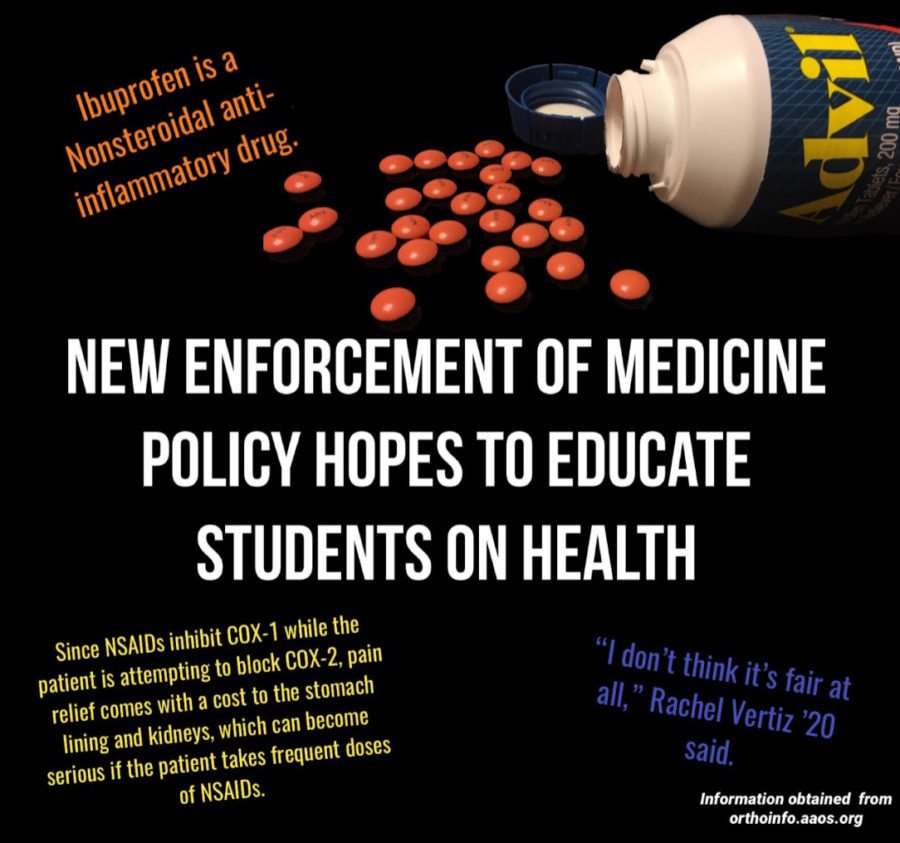Medicine policy enforced, promoting education
The new enforcement has many students upset, but the health office aims to use this policy to encourage education about recurring pain.
The Cathedral Catholic High School medical office has begun enforcing a pre-existing medicine policy, which states that students may only receive medicine for the same ailment twice, to the widespread disapproval of the student body.
“I just don’t understand why the school gave such a limited amount of advil rations to the kids,” CCHS student Rachel Vertiz ’20 said. “It still frazzles me, but I’m really glad this is my last year here, so that I don’t have to put up with that rule.”
Ibuprofen, which is more commonly referred to as the brand name Advil, is a type of nonsteroidal anti-inflammatory drug (NSAID), that can be taken over the counter. According to orthoinfo.aaos.org, NSAIDs work by preventing the enzyme cyclooxygenase (COX), which comes in two forms, COX-1, which protects the stomach lining from harsh acids and digestive chemicals, and helps maintain kidney function, and COX-2, which is produced when joints are injured or inflamed, from functioning.
Since NSAIDs inhibit COX-1 while the patient is attempting to block COX-2, pain relief comes with a cost to the health of the stomach lining and kidneys, which can become serious if the patient takes frequent doses of NSAIDs.
The negative effects of NSAIDs, as well as a notable increase in students coming in for Advil during the 2018-2019 school year has caused alarm in the Cathedral Catholic High School health office, and therefore prompted them to enforce the existing policy which states that “any student who requires medication for the same reason more than two days over the course of any school year…must be evaluated by a medical professional before that medication is re-administered at school. If the need is anticipated to occur again, the student’s medical provider will have to “prescribe” the medication…, and parent should bring in their own supply.”
The sudden enforcement of this policy as raised many negative feelings among students.
“I don’t think it’s fair at all,” Vertiz said. “It is really really unfair for me especially, as I get stressed out very easily, so I get headaches all the time. If I did not bring any Advil to school from my house, I would usually go to the nurse and get some, but with this new policy I can’t get any.
“I used my first two chances to get advil in the first week of school on the first and third day. It’s not fair to me and to other students who suffer from the same stress inducing headaches as I do.”
The health office hopes this new policy will encourage students to seek medical attention for recurring pain, according to Nurse Kate Pe.
“We have an overseeing physician who writes all of our orders,” Nurse Pe said. “He just wants to make sure that if someone is coming in habitually for over the counter medication, that they are actually being evaluated by their physician, so that something isn’t being missed.”
The health office also aims to educate students on the causes of their pain and find healthier and more natural cures.
Students frequently enter the health office seeking Advil to mitigate a headache, however when prompted they reveal they are dehydrated, lacking sleep, or most often they have not eaten anything in that day, Nurse Pe said. When this happens, Nurse Pe will offer students some water, a chance to lie down for twenty minutes, or some snacks to see if the headache can be eliminated without the use of medication.
The enforcement of the twice-a-year medication has many girls worried about what it means for their menstruation cramps.
“It’s really messed up for the girls here on campus,” Vertiz said. “We all get cramps once a month or back pain, and for us to only being able to receive advil twice a year for something natural we get every month is just totally ridiculous.”
However Nurse Pe stated that frequent cramps that require pain-killers are not normal and should be addressed by a physician. Frequent intense cramps can be a sign of other health issues, such as endometritis, which the health office brought Doctor Iris Kern Orbuch to talk about last year.
“We are trying to push the education aspect of health,” Nurse Pe said. You guys are growing and will soon be off in the real world, and we want to give you the tools to take care of yourself. Especially in today’s society, we don’t want to be taking medication as a bandaid. We want to understand the root of why we are having an issue.”

As I ecstatically enter my senior year and second year on El Cid, I look forward to my new position of Social Media Editor, which I plan to take to new...






















































